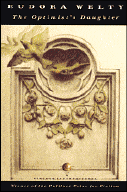
From the Publisher
“It is easy to praise Eudora Welty,” as Robert Penn Warren has written, “but it is not so easy to analyze the elements in her work that make it so easy—and such a deep plea-sure—to praise. To say that may, indeed, be the highest praise, for it implies that the work, at its best, is so fully created, so deeply realized, and formed with such apparent in-nocence that it offers only itself, in shining unity.”
The Optimist’s Daughter is Miss Welty’s work at its best, and reconfirms Mr. Warren’s general tribute, including the difficulty of analysis: Laurel Hand, long absent from the South, comes from Chicago to New Orleans, where her father dies after surgery. With Fay, the stupid new young wife of her father, Laurel returns to her former Mississippi home and stays a few days after the funeral for reunions with old friends. In a night alone in the house she grew up in, she confronts elements of the past and comes to a better understanding of it and of herself and her parents.
The simplicity of the story belies its universal implications. This is a story of “the great interrelated family of those who never know the meaning of what happened to them.” With unsurpassed artistry Miss Welty shows us Laurel’s struggle to come to terms with her father’s death and with the life of the small Mississippi town he was so intimately involved with. In trying to deal with people who, like Fay, never even care to un-derstand what has happened to them, Laurel realizes that she too has kept her distance from a shared past. Like so many today, Laurel has lived in a city where she survives by avoiding any realinvolvement with those around her. It is only the shock of her father’s death that leads her to new insights into the relationship between love and death and memory.
Certainly this book will be a rewarding experience to readers of Miss Welty’s earlier work. Newcomers will discover its many dimensions and great substance: the large cast of characters and the complexity of their relationships, the rich humor and subtlety of dialogue that reveals without describing, the wideness of scope compressed within the boundaries of a short novel, the wisdom and discernment that underlie the author’s vision of human life.
About the Author
Eudora Welty was born in Jackson, Mississippi, on April 13, 1909, and attended the public schools there. She published several pieces in magazines for children before she reached her teens. From 1925-1927, she attended Mississippi State College for Women (MSCW, or the "W" as it was called) in Columbus, but transferred for her final two years of college to the University of Wisconsin in Madison. She spent an academic year in New York City, studying at the Columbia University School of Business but attending lectures, plays, concerts, and art exhibitions as well. The untimely death of her father in 1931 prompted her return to Jackson, where she worked for the local radio station and wrote Jackson and Delta society news for the Memphis, Tennessee, Commercial Appeal, a major newspaper for northwest Mississippi. In 1935 and 1936, she worked for Franklin Roosevelt's New Deal program the Works Progress Administration (WPA), serving as a "junior publicity agent" and traveling to many parts of Mississippi to promote road building, new airstrips, canning factories, and other efforts to bring economic progress to poor and remote rural areas of the state. In 1936 she published her first important short story, and from that time onward her writing career expanded and found considerable success, as the list of book publications below indicates. All of Welty's writing is the product of a determined shaping imagination and a deep love and understanding for the power of carefully chosen language to evoke charactersin dramatic motion. Her stories are very much created by her own art out of materials she found and was touched by, material assembled by the artist's eye.
